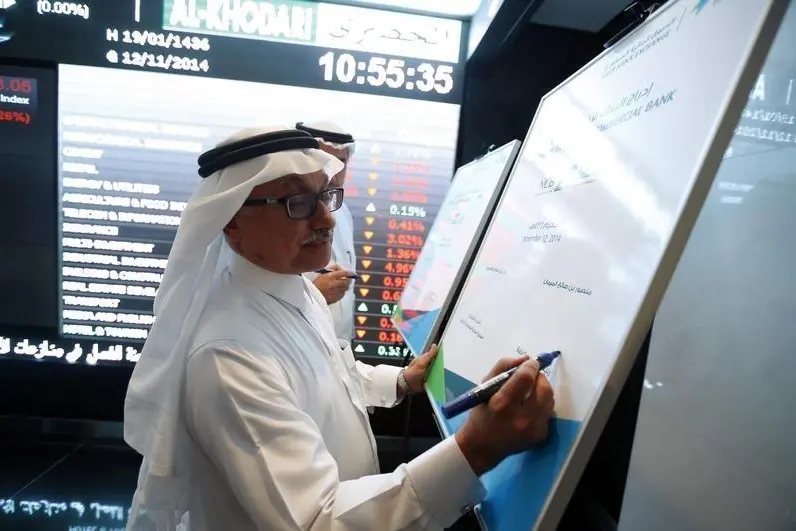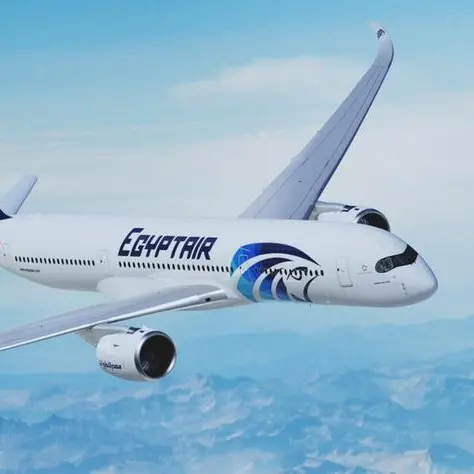PHOTO
By Celine Aswad and Andrew Torchia
DUBAI, June 21 (Reuters) - Saudi Arabia's stock market jumped over 5 percent on Wednesday after the architect of the kingdom's economic reforms was appointed crown prince and index compiler MSCI said it would consider upgrading Riyadh to emerging market status.
The stock index surged 5.5 percent, its largest single-day rise since August 2015, to 7,335 points, its highest level since December 2015. Trading volume was the largest this year.
Fund managers said the appointment of Prince Mohammed bin Salman, previously deputy crown prince, to be first in line for the throne was not unexpected, but came sooner than anticipated.
He has been the catalyst for radical reforms to reduce Saudi Arabia's dependence on oil exports, ranging from a plan to sell a stake in national oil giant Saudi Aramco and dozens of other institutions and reinvest the money in non-oil industries, to tough austerity plans to eliminate a huge budget deficit.
"For the first time in two years, investors will feel reassured that the economic reform plan Vision 2030 will not be scrapped," said Ayham Kamel, director of the Middle East and North Africa at consultancy Eurasia Group.
As defence minister Prince Mohammed has overseen the war in Yemen and taken a tough line towards Iran, so some analysts fear his promotion could raise geopolitical tensions.
But investors were not focusing on geopolitics on Wednesday. National Commercial Bank , the biggest listed lender which is expected to help arrange the privatisation programme and play a major role in funding some of the new non-oil industries, soared 10 percent.
Mining company Ma'den jumped 9.7 percent. Mining is a key sector in Prince Mohammed's plans to cut the kingdom's reliance on oil.
Real estate developers were also strong, especially those that are working with the government on projects. Emaar the Economic City , which is developing an industrial city near Jeddah, shot up 10.2 percent.
To mark Prince Mohammed's promotion, the government said it was restoring financial allowances to civil servants retroactively to last September. This did not appear to involve a lot of money - Mazen al-Sudairi, head of research at Al Rajhi Capital, estimated 8 or 9 billion riyals ($2.1 billion to $2.4 billion) - but it lifted investor sentiment.
The market was also buoyed by news that index compiler MSCI would, as expected, start to consider whether to upgrade Saudi Arabia to emerging market status. An upgrade would probably take effect in 2019, eventually attracting tens of billions of dollars of fresh foreign money.
Iyad Ghulam, senior equities analyst at NCB Capital, said the MSCI news might give the market support for the medium term.
"We expect the market to rise 20 to 30 percent from the day of the MSCI announcement on putting Saudi on the short list until the decision date in June 2018," Ghulam said.
Food maker Almarai jumped 9.1 percent to close at 90.00 riyals on Wednesday; it hit an all time intra-day high of 90.70 riyals.
EFG Hermes predicts Almarai would see up to $405 million of passive fund inflows from an MSCI upgrade, plus up to $183 million if FTSE decides this September to upgrade Saudi Arabia.
OIL
Elsewhere in the Gulf, Brent oil's fall to below $46 a barrel - to levels not seen since November, before global oil producers agreed to cut output to prop up prices - hurt stock markets.
While not disastrous for countries that have embarked on austerity programmes, it could mean governments have less room to boost spending this year than hoped.
Dubai's index lost 1.0 percent as Dubai Financial Market , the only listed exchange in the Gulf, fell 3.4 percent. The Abu Dhabi index closed near flat.
In Qatar, the index sank for a fourth consecutive day to its lowest close in 17 months. Petrochemical producer Industries Qatar fell 2.7 percent.
The index has shed 11.6 percent since June 5, when Saudi Arabia and three other Arab states cut diplomatic and trade links with Doha.
HIGHLIGHTS
SAUDI ARABIA
* The index
.TASI
surged 5.5 percent to 7,335 points.
DUBAI
* The index
.DFMGI
lost 1.0 percent to 3,418 points.
ABU DHABI
* The index
.ADI
edged up 0.1 percent to 4,459 points.
QATAR
* The index
.QSI
dropped 1.8 percent to 8,778 points.
EGYPT
* The index
.EGX30
fell 0.3 percent to 13,376 points.
KUWAIT
* The index
.KWSE
edged down 0.3 percent to 6,765 points.
BAHRAIN
* The index
.BAX
fell 0.4 percent to 1,313 points.
OMAN
* The index
.MSI
declined 1.4 percent to 5,121 points.
(Editing by Susan Thomas) ((celine.aswad@thomsonreuters.com)(+9715 56224 7653)(Reuters Messaging: celine.aswad.thomsonreuters.com@reuters.net))
DUBAI, June 21 (Reuters) - Saudi Arabia's stock market jumped over 5 percent on Wednesday after the architect of the kingdom's economic reforms was appointed crown prince and index compiler MSCI said it would consider upgrading Riyadh to emerging market status.
The stock index surged 5.5 percent, its largest single-day rise since August 2015, to 7,335 points, its highest level since December 2015. Trading volume was the largest this year.
Fund managers said the appointment of Prince Mohammed bin Salman, previously deputy crown prince, to be first in line for the throne was not unexpected, but came sooner than anticipated.
He has been the catalyst for radical reforms to reduce Saudi Arabia's dependence on oil exports, ranging from a plan to sell a stake in national oil giant Saudi Aramco and dozens of other institutions and reinvest the money in non-oil industries, to tough austerity plans to eliminate a huge budget deficit.
"For the first time in two years, investors will feel reassured that the economic reform plan Vision 2030 will not be scrapped," said Ayham Kamel, director of the Middle East and North Africa at consultancy Eurasia Group.
As defence minister Prince Mohammed has overseen the war in Yemen and taken a tough line towards Iran, so some analysts fear his promotion could raise geopolitical tensions.
But investors were not focusing on geopolitics on Wednesday. National Commercial Bank , the biggest listed lender which is expected to help arrange the privatisation programme and play a major role in funding some of the new non-oil industries, soared 10 percent.
Mining company Ma'den jumped 9.7 percent. Mining is a key sector in Prince Mohammed's plans to cut the kingdom's reliance on oil.
Real estate developers were also strong, especially those that are working with the government on projects. Emaar the Economic City , which is developing an industrial city near Jeddah, shot up 10.2 percent.
To mark Prince Mohammed's promotion, the government said it was restoring financial allowances to civil servants retroactively to last September. This did not appear to involve a lot of money - Mazen al-Sudairi, head of research at Al Rajhi Capital, estimated 8 or 9 billion riyals ($2.1 billion to $2.4 billion) - but it lifted investor sentiment.
The market was also buoyed by news that index compiler MSCI would, as expected, start to consider whether to upgrade Saudi Arabia to emerging market status. An upgrade would probably take effect in 2019, eventually attracting tens of billions of dollars of fresh foreign money.
Iyad Ghulam, senior equities analyst at NCB Capital, said the MSCI news might give the market support for the medium term.
"We expect the market to rise 20 to 30 percent from the day of the MSCI announcement on putting Saudi on the short list until the decision date in June 2018," Ghulam said.
Food maker Almarai jumped 9.1 percent to close at 90.00 riyals on Wednesday; it hit an all time intra-day high of 90.70 riyals.
EFG Hermes predicts Almarai would see up to $405 million of passive fund inflows from an MSCI upgrade, plus up to $183 million if FTSE decides this September to upgrade Saudi Arabia.
OIL
Elsewhere in the Gulf, Brent oil's fall to below $46 a barrel - to levels not seen since November, before global oil producers agreed to cut output to prop up prices - hurt stock markets.
While not disastrous for countries that have embarked on austerity programmes, it could mean governments have less room to boost spending this year than hoped.
Dubai's index lost 1.0 percent as Dubai Financial Market , the only listed exchange in the Gulf, fell 3.4 percent. The Abu Dhabi index closed near flat.
In Qatar, the index sank for a fourth consecutive day to its lowest close in 17 months. Petrochemical producer Industries Qatar fell 2.7 percent.
The index has shed 11.6 percent since June 5, when Saudi Arabia and three other Arab states cut diplomatic and trade links with Doha.
HIGHLIGHTS
SAUDI ARABIA
* The index
DUBAI
* The index
ABU DHABI
* The index
QATAR
* The index
EGYPT
* The index
KUWAIT
* The index
BAHRAIN
* The index
OMAN
* The index
(Editing by Susan Thomas) ((celine.aswad@thomsonreuters.com)(+9715 56224 7653)(Reuters Messaging: celine.aswad.thomsonreuters.com@reuters.net))





















